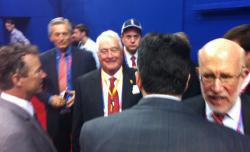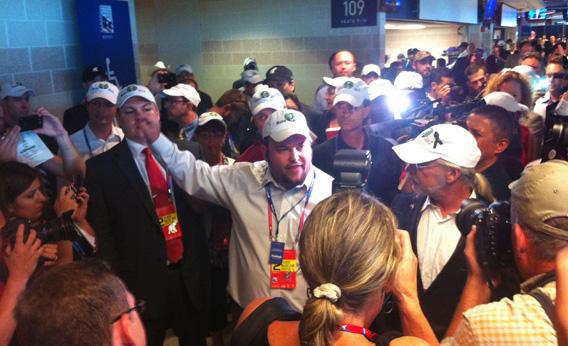Read the rest of Slate’s coverage from the GOP convention.
TAMPA – Sen. Rand Paul was trapped in a corner. It’d been like this all afternoon. He’d been walking the floor of the Tampa Bay Times Forum, hounded by reporters, having the same conversation with every delegate loyal to his father’s campaign as bulky cameras nosed in. They were diehards, angry that a quick vote on the Republican National Convention platform had affirmed a rule that blocked some of their fellow delegates. David Jaques, an Oregon “Ron Paul follower for 20-plus years” told the senator that he still wanted to put the candidate’s name into nomination. The senator kept telling him not to.
“It does break my heart,” he said. “But we fight on. We won’t stop. We’ve just got to follow the rules.”
“We tried to play by the rules in Oregon,” said Jaques, “and they just threw ‘em out the window.”
Sen. Paul reasoned with him. “Realize, as I go about this room, hundreds of people have come up to me,” he said. “There is support out here. We’re not gonna win this time. Maybe next time. Maybe the time after. The party can only grow bigger, and there’s only so many places they can win without us.”
Right then a short, white-bearded man marched past Sen. Paul, over to his chief of staff, Doug Stafford. It was Ben Ginsberg—veteran of the Bush-Gore recounts, top legal macher for Mitt Romney, “the lawyer for the Republican establishment,” author of a new Republican National Committee rule that would bind delegates more closely to winning candidates. Ginsburg, carrying a sheaf of papers, leaned in and buttonholed Stafford.
“I’ve got your guys trying to put Paul’s name into nomination,” he said, pointing at the papers. “Right here, buddy.”
Ginsberg, having delivered the message, kept on walking. Stafford didn’t know what to say. “He was yelling so much that I couldn’t hear him,” he explained.
But Ginsberg had nothing to worry about. There would be no nominating Ron Paul from the floor. John Sununu—who had just gotten the new rules pushed through the committee—nominated Mitt Romney for president. Nobody nominated Ron Paul. After each state announced its delegate totals, only Romney’s totals were repeated and put on the convention’s mega-screens.
The Paul fans, with a combination of irritation and acceptance, would try and amend that by—what else?—yelling. It went like this:
State: Missouri casts four votes for Ron Paul, and 45 votes for the next president of the United States, Mitt Romney!
Chair: Missouri: 45, Romney!
Whole bunch of people: And four for Ron Paul!
What else were they going to do? Ron Paul’s 202-delegate haul was a footnote to the 2012 convention, a riveting distraction that few voters actually watched. “Probably CNN will find a way [to cover it],” snarked Haley Barbour, speaking for just about every non-Paulian Republican. It was fantastic television and even better blog fodder—give ‘em enough cameras and a hundred or so people can cause “mayhem,” even if nobody actually gets hurt.

Photograph by David Weigel.
But the rules that most outraged the Paul delegates will outlast Paul. In the Michael Steele era, when Republicans busily reverse-engineered the techniques Barack Obama used to beat them, the party changed primary and delegate rules to make them more competitive. If a state held a primary before April 1, it couldn’t set up “winner-take-all” rules without punishment—losing half of its delegates. That rule was scrapped. Many states left it up to conventions and caucuses to choose the “unpledged” members of the delegation. That was changed, too. In 2016 (if that’s the next open Republican primary), if, say, Artur Davis wins Iowa and the nomination, it would no longer be possible for some other candidate’s supporters to take over a convention and choose non-Davis delegates.
The meeting that altered these rules was swift, crowded, and brutal. After Sununu gaveled it in, a group of Paul delegates from Nevada gathered in a circle, hugging, and comforting the ones who’d started to cry. “Tyranny wins again,” muttered a Nevada alternate delegate, Marla Criss. Morton Blackwell, the Virginia delegate who’d teamed up with the Paul faction, left the meeting shortly after Sununu did. When Sununu saw his defeated rival, he offered him a handshake: “Well fought.” The people who wanted longer primaries and meaningful state conventions had clearly lost.
And most of these people, in 2012, were supporters of Ron Paul. When news of the rule changes got to them on the convention floor, they stewed and predicted the death of local politics.
“It’s the end of the grassroots,” sighed Jim Ayala, a Nevada delegate for Paul, who wore his Oath Keepers T-shirt to the floor. “It’s going to ruin the Republican Party.” Ayala had been part of a pro-Paul faction that dominated the 2008 Nevada conventions before the old rules helped take their delegates away. “I’ve been waiting to get here for five years, and I don’t know if anyone like me will get here again.”
This panic hasn’t spread. Matt Kibbe, the president of the Tea Party group FreedomWorks, was annoyed by the rule changes, and the GOP’s fear of “beautiful chaos.” But he wasn’t worried.
“The Utah convention process was designed to protect incumbents,” said Kibbe. “And yet [Sen.] Mike Lee won there, and [anti-Tea Party quote machine and former Sen.] Bob Bennett lost.” The people who wanted to stop coronations would learn the new rules. “Mitt Romney will be the last Republican nominee chosen by the insiders.”
And it’s no fun to be the last hold-out as the Insiders’ candidate gets crowned. The last, fitful exertions by Paul’s delegates were handled like the blatherings of senile uncles at Thanksgiving. When one Romney delegate saw a “Ron Paul R3VOLUTION” sign go up in the Nevada delegation, he squeezed next to the culprit and held up a MITT sign. One of Paul’s Texas delegates, Sung Song, tried to wave a Ron Paul flag during his state’s roll call. A Romney volunteer in a khaki suit hustled over to stop him.
“That’s not an approved sign,” said the enforcer.
Song folded up the sign inside one of the Romney placards, and put them both down. A fellow delegate walked over to commiserate.
“Oh, okay” he said. “Now they care about the rules?”
